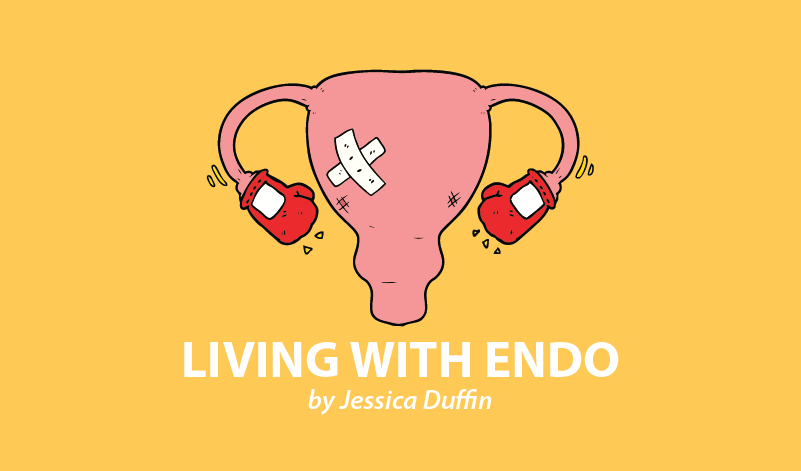Sometimes I can be really hippy with my management of endometriosis. Conventional medicine is important and often necessary, yet I like to combine this with various therapies and healing tools to help me emotionally as well. From crystals to prayer to Reiki, these forms of healing may not be proven by science, but in most cases, I suspect you can get more comfort from them than another trip to a cold and sterile doctor’s surgery.
Yes, we need surgery to remove endometriosis and we may need prescription drugs for the pain, but we also need to be able to manage the stress, anxiety, and depression that so often come with endometriosis.
The impact of stress on the female body and on female hormones is significant, especially for those with endometriosis. These women have an issue with estrogen dominance, and endometriosis not only produces its own estrogen, it also thrives off it.
When we are stressed, our bodies release the hormone cortisol, which can be helpful in reasonable doses. But for those who are feeling constantly overwhelmed and stressed from living with a chronic disease and its challenges, there could be too much cortisol being released. This could have adverse effects on endometriosis, as “cortisol competes with progesterone for receptors, and always wins, leaving the body with less progesterone to use,” according to nutritional therapist Jodie Brandman. “When there is too much cortisol, there is an increase in estrogen, which can lead to estrogen dominance.”
Recently, I’ve been writing about different forms of talking therapy to help cope with the stresses and the mental implications of endometriosis, which could not only alleviate stress but also could indirectly reduce cortisol levels in the body.
I am a highly stressed individual — my natural state, quite honestly, is stressed. It’s always been this way, and as the years go on, it’s having a real impact on my management and experience of endometriosis, mental health, and quality of life.
I’ve tried a lot of therapies, and they’ve all been helpful to one degree or another, and yet, I’ve still not been able to tame the beast. I still can’t get a grip on my stress and anxiety levels.
So now, I’m about to try Rapid Transformational Therapy. I appreciate that the name might sound a bit scammy; the packaging of the therapy is pretty “salesy,” too. But from my research, the results seem to be genuine.
“Rapid Transformational Therapy is a hybrid therapy, that offers unparalleled results; combining the most beneficial principles of Hypnotherapy, NLP, Psychotherapy & Cognitive Behavioral Therapies,” explains Sally Guthrie. It was developed by Marissa Peer, who was named as Britain’s best therapist and is a trained psychologist and hypnotherapist with an incredible client list and decades of experience.
During Rapid Transformational Therapy, just like hypnotherapy, clients are relaxed to the point where the subconscious mind can be accessed. Then regression is used to observe and understand the most significant events in a client’s life that have led to behavioral patterns they want to break — in my case, being chronically stressed.
The client is safe with the guidance of the therapist and is able to access these memories without reliving them and experiencing the painful emotions they felt at the time. The therapist then talks through these memories with the client, still during hypnotherapy, using techniques to help undo the learned beliefs and behaviors.
The session, which from my understanding lasts about two hours, is supposed to be incredibly effective. Most clients have ongoing support for three weeks, after which they see such a dramatic change that they no longer need any support for that particular issue.
For myself, and I’m sure for many others, it almost sounds too good to be true. But I’ve spoken to a couple of trained therapists who have confirmed the success rate to me, and I’ve also listened to some recordings of clients in a session.
However, one of my concerns is that not every therapist trained in RTT has an extensive history in psychology, so when searching for my own therapist, I checked their background to ensure I was booking with someone who knew how to support me best.
I haven’t had my session, but it’s booked in, and I have to admit, I’m incredibly excited by the possibility of being able to cope with endometriosis from a calmer place.
I’ll be writing a column about my experience once it’s complete, but if you’re interested in finding out more, I suggest you have a listen to Jess Lively’s interview with Marissa Peer and a live recording of a session on the Lively Show.
I look forward to reporting back, hopefully from my new Zen-like state.
***
Note: Endometriosis News is strictly a news and information website about the disease. It does not provide medical advice, diagnosis, or treatment. This content is not intended to be a substitute for professional medical advice, diagnosis, or treatment. Always seek the advice of your physician or other qualified health provider with any questions you may have regarding a medical condition. Never disregard professional medical advice or delay in seeking it because of something you have read on this website. The opinions expressed in this column are not those of Endometriosis News or its parent company, BioNews Services, and are intended to spark discussion about issues pertaining to endometriosis.


